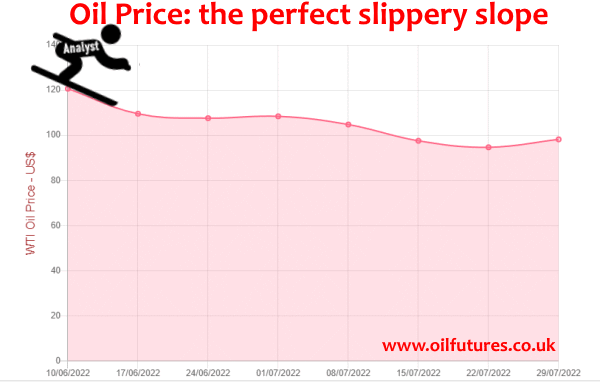The fall of the prices of crude oil has been continuing for the whole week despite the obvious supply woes: the price of WTI and Brent fell below $90 and $100 respectively for the first time since the Russia-Ukraine war.
As of 13:40 GMT, the price of WTI and Brent were at $88.66 and $94.32 respectively.
It is clear the fact that the US, world's larges economy, fell into recession played a major role in the lingering anxieties of the investors; the news that broke out on Thursday with the warning about the UK also falling into recession this year did not help alleviate the sentiments.
Both the US and UK saw a sharp contraction of their respective economies, which is often blamed on the rising energy costs.
Although the Biden administration questions the technical definition of a recession, despite the economic showing contractions for two successive quarters, the Governor of the Bank of England did not mince his words while announcing the impeding disaster, while hiking the interest rate to staggering 1.75% in order to curb the inflation - the biggest of its kind in 27 years,
The other major global economies will not be immune to the economic troubles that stem from the unstable supply of oil and gas either; analysts, for instance, are really worried about the state of the German economy, the biggest in the European Union, due to its heavy reliance on Russian gas.
If the major European economies were to be forced to ration gas supply to the industries and ordinary consumers in the forthcoming colder months, to put it simply, the writing would be on the wall.
At present, the only factor that may lend somewhat support to the crashing oil price is the price of LNG, liquified natural gas. At 14:50 GMT, it stood at $8.02, having recorded more than 100% rise since February this year.
If heavy industries are compelled to switch to oil from gas due to high gas prices that will in turn potentially increase the demand for oil further; a development of that kind may inhibit the rapid fall of oil prices to some extent - at least in the short run.
Despite the fall in price, the OPEC+ agreed to increase the production by 100,000 bpd something analysts think too modest.
It, however, along with some recent developments, show that President Biden's visit to the Middle East last month was not a total failure after all; by coincidence, the US approved the sale of Patriotic missiles to Saudi Arabia and THAAD missile system to the UAE - after the recent visit by President Biden.







